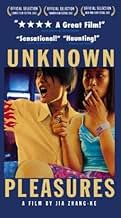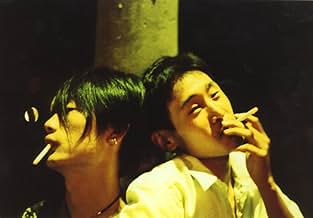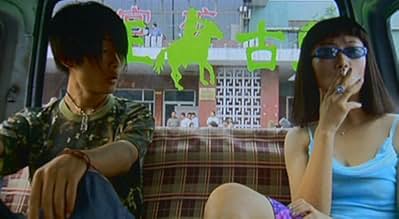Aggiungi una trama nella tua linguaTwo unemployed Chinese teenagers have trouble resisting the temptations of the Western world.Two unemployed Chinese teenagers have trouble resisting the temptations of the Western world.Two unemployed Chinese teenagers have trouble resisting the temptations of the Western world.
- Regia
- Sceneggiatura
- Star
- Premi
- 2 vittorie e 5 candidature totali
Limin Wang
- The Karaoke Customer
- (as Wang Li Min)
Juan Antonio Samaranch
- Self
- (filmato d'archivio)
- (non citato nei titoli originali)
Jia Zhang-ke
- Man singing in street
- (non citato nei titoli originali)
Recensioni in evidenza
The story begins with an outline of the mundaneness of the lives and future of two Chinese youths, and progresses into showing in a short amount of time just how much their lives and personal situations change; dealing with unemployment, troublesome love lives and coming into their own a beautiful story unfolds.
With allusions to the film Pulp Fiction throughout and a recurring song that touches the heart, with solid performances by all of the actors (especially Zhao Tao) it was a very good film. My only criticism is at times the story can be slow, though overall the story is far more interesting than one sees in normal cinema.
The film was particularly strong in the simplistic nature of the film-making itself, with nothing ever over-the-top. It aimed to tell the situation as how it really is, and to tell life like how it really is, not some sort of Hollywoodized conception of life. The artistic reflection that was put into the film shows a great and amazing depth to it that is often hard to find.
Overall, a great film my Jia Zhang-ke. The feelings of hopelessness that he is able to make oneself feel make this a must-see for anyone who enjoys sad cinema and existentialism, and is interested in the struggles of youth and issues of modernization and globalization.
With allusions to the film Pulp Fiction throughout and a recurring song that touches the heart, with solid performances by all of the actors (especially Zhao Tao) it was a very good film. My only criticism is at times the story can be slow, though overall the story is far more interesting than one sees in normal cinema.
The film was particularly strong in the simplistic nature of the film-making itself, with nothing ever over-the-top. It aimed to tell the situation as how it really is, and to tell life like how it really is, not some sort of Hollywoodized conception of life. The artistic reflection that was put into the film shows a great and amazing depth to it that is often hard to find.
Overall, a great film my Jia Zhang-ke. The feelings of hopelessness that he is able to make oneself feel make this a must-see for anyone who enjoys sad cinema and existentialism, and is interested in the struggles of youth and issues of modernization and globalization.
Unknown Pleasures, directed by Jia Zhangke, powerfully brings home the spiritual malaise affecting Chinese youth as a result of global capitalism. Although the film is set in a small, impoverished Chinese city in remote Shanxi province close to the Mongolian border, there is almost nothing traditionally Chinese in this film other than the location.
Two 19-year olds, Bin Bin (Zhao Wei Wei) and Xiao Ji (Wy Qiong) are heavily influenced by American culture and seem to exist only for their own immediate pleasure. They live on the margins in a city where, according to the director, two-thirds of the population were unemployed in 2001. They drink coke, chain smoke cigarettes, covet U.S. dollars, talk excitedly about Hollywood movies such as Pulp Fiction, and dance to Western-style music at the local club. In the words of Kent Jones (Film Comment Sept/Oct 2002), the protagonists are "media-addicted, resigned to momentous change, and powerless to understand or affect it".
Bin Bin lives with his mother (Bai Ru), who works at a local textile factory and sympathizes with the Falun Gong (an extreme Buddhist religious sect that has been persecuted by the Chinese Communist government). Apathetic and disengaged with no job and nothing to do, the two friends hang around the local community center playing pool and chatting with the regulars. After trying out for an acting job, Xiao Ji becomes attracted to Qiao Qiao (Zhao Tao) whose protective lover is gangster Quiao San. Xiao follows her around but seems unable or unwilling to make a move. When they finally go dancing, Xiao has to confront the threats of Quiao San's goons who finally catch up with him and slap him around.
Bin Bin also has a girlfriend, Yuan Yuan (Zhou Qing Feng), but their romance seems to consist only in watching movies in a hotel room and singing popular songs (whose words suggest their own lives). Yuan Yuan has more purpose in life than Bin Bin and wants to study International Trade in Beijing. In a scene depicting Jia's wry humor, Xiao Ji puts Yuan's studies in perspective by saying, "WTO is nothing. Just a trick to make some cash" and Bin Bin declares to Yuan Yuan, " It is said that international trade is about buying rabbits to resell in the Ukraine." With little interest in common, they slowly drift apart. In a very telling scene, as Bin Bin sits in a booth in the inside of a train station staring blankly, Yuan Yuan rides her bicycle around and around, waiting for him to throw off his lethargy and join her.
Though the boys hear about events in the outside world on television, for example, the winning of the Olympic Games by Beijing and the arrest of the leaders of the Falun Gong in Japan, they don't seem affected. Seemingly inured to unexplained violence, they are just mildly perplexed when a bomb explodes nearby with tragic results. Bin Bin asks whether the United States is attacking China.
Shot in digital video that enhances its authenticity, Jia avoids pathos and sentimentality for a documentary-style realism that is deeply affecting. Although he focuses on the boys as victims of social and economic dislocation in China, the theme is more about feelings of abandonment, loneliness, and emotional numbness. Jia, one of the best of China's new generation underground "indie" directors, has captured this sense of ennui more palpably than any movie I've seen in a long, long time. When Xiao finally abandons his sputtering motor bike in the middle of a new superhighway, Jia seems to be suggesting that both he and China itself are at a precarious crossroads in their existence and must discard what isn't working if they are to move on.
Two 19-year olds, Bin Bin (Zhao Wei Wei) and Xiao Ji (Wy Qiong) are heavily influenced by American culture and seem to exist only for their own immediate pleasure. They live on the margins in a city where, according to the director, two-thirds of the population were unemployed in 2001. They drink coke, chain smoke cigarettes, covet U.S. dollars, talk excitedly about Hollywood movies such as Pulp Fiction, and dance to Western-style music at the local club. In the words of Kent Jones (Film Comment Sept/Oct 2002), the protagonists are "media-addicted, resigned to momentous change, and powerless to understand or affect it".
Bin Bin lives with his mother (Bai Ru), who works at a local textile factory and sympathizes with the Falun Gong (an extreme Buddhist religious sect that has been persecuted by the Chinese Communist government). Apathetic and disengaged with no job and nothing to do, the two friends hang around the local community center playing pool and chatting with the regulars. After trying out for an acting job, Xiao Ji becomes attracted to Qiao Qiao (Zhao Tao) whose protective lover is gangster Quiao San. Xiao follows her around but seems unable or unwilling to make a move. When they finally go dancing, Xiao has to confront the threats of Quiao San's goons who finally catch up with him and slap him around.
Bin Bin also has a girlfriend, Yuan Yuan (Zhou Qing Feng), but their romance seems to consist only in watching movies in a hotel room and singing popular songs (whose words suggest their own lives). Yuan Yuan has more purpose in life than Bin Bin and wants to study International Trade in Beijing. In a scene depicting Jia's wry humor, Xiao Ji puts Yuan's studies in perspective by saying, "WTO is nothing. Just a trick to make some cash" and Bin Bin declares to Yuan Yuan, " It is said that international trade is about buying rabbits to resell in the Ukraine." With little interest in common, they slowly drift apart. In a very telling scene, as Bin Bin sits in a booth in the inside of a train station staring blankly, Yuan Yuan rides her bicycle around and around, waiting for him to throw off his lethargy and join her.
Though the boys hear about events in the outside world on television, for example, the winning of the Olympic Games by Beijing and the arrest of the leaders of the Falun Gong in Japan, they don't seem affected. Seemingly inured to unexplained violence, they are just mildly perplexed when a bomb explodes nearby with tragic results. Bin Bin asks whether the United States is attacking China.
Shot in digital video that enhances its authenticity, Jia avoids pathos and sentimentality for a documentary-style realism that is deeply affecting. Although he focuses on the boys as victims of social and economic dislocation in China, the theme is more about feelings of abandonment, loneliness, and emotional numbness. Jia, one of the best of China's new generation underground "indie" directors, has captured this sense of ennui more palpably than any movie I've seen in a long, long time. When Xiao finally abandons his sputtering motor bike in the middle of a new superhighway, Jia seems to be suggesting that both he and China itself are at a precarious crossroads in their existence and must discard what isn't working if they are to move on.
Learning that this film is from the makers of the tedious PLATFORM is not encouraging and the new work has the same murky color and long, unedited shot coverage.
However this one benefits from the stronger narrative elements - nihilistic kids turn to crime as their ambitions are thwarted, no mating with the traveling show chantoosie or becoming a Beijing soldier - along with the detailed account of joyless small town Datong Province life in decaying buildings where finding a US dollar in the liquor bottle the entertainers are plugging represents sudden fortune.
In the line of BEIJING BASTARDS and less engaging that GE GE/ BROTHER which covers much the same ground, this still suggests that the Chinese cinema may be evolving a sub-surface layer of effective, critical entertainment.
However this one benefits from the stronger narrative elements - nihilistic kids turn to crime as their ambitions are thwarted, no mating with the traveling show chantoosie or becoming a Beijing soldier - along with the detailed account of joyless small town Datong Province life in decaying buildings where finding a US dollar in the liquor bottle the entertainers are plugging represents sudden fortune.
In the line of BEIJING BASTARDS and less engaging that GE GE/ BROTHER which covers much the same ground, this still suggests that the Chinese cinema may be evolving a sub-surface layer of effective, critical entertainment.
Unknown Pleasures portrays Bin Bin and Xiao Ji, two young Chinese men living in the city of Datong, several hundred miles west of Beijing. Theirs is a city in transition; crowded streets and apartment blocks back onto building sites, weird landscapes of debris and raw materials. The growing commercialisation of Chinese society is readily apparent; in an early scene the duo attend a lurid road show promotion for alcoholic drinks. The television news that punctuates the film shows the changes and conflicts in China and the effect these are having across the world, from the controversial US spy plane crash to the award of the Olympic games for 2008.
The two young protagonists are outsiders in their changing city. Bin Bin, newly unemployed, lives with his mother. Unwilling then unable to find new employment, he becomes increasingly despondent. His relationship with his girlfriend, Yuan Yuan, is lived out in front of a television screen: they rarely make eye contact. The cultural void in his life feels remarkably Western. Xiao Ji works for his father's garage business. Whilst Bin Bin becomes increasingly downcast, Xiao Ji dreamily pursues Xiao Wu, a dancer with the aforementioned road show, risking the anger of her volatile boyfriend.
The overlapping stories of the two friends develop a common theme of loneliness and yearning on the fringes of a rapidly changing society. The sense of despair and malaise in their lives is powerfully conveyed, but the increasing aimlessness of their activities makes for slow and often difficult viewing. The final third of the film is particularly slow, with many drawn-out scenes. Despite this slackening of the pace, an unexpected twist at the end rams home the film's message that, along with the new freedoms in China, there is disenchantment with the new shape of society.
The two young protagonists are outsiders in their changing city. Bin Bin, newly unemployed, lives with his mother. Unwilling then unable to find new employment, he becomes increasingly despondent. His relationship with his girlfriend, Yuan Yuan, is lived out in front of a television screen: they rarely make eye contact. The cultural void in his life feels remarkably Western. Xiao Ji works for his father's garage business. Whilst Bin Bin becomes increasingly downcast, Xiao Ji dreamily pursues Xiao Wu, a dancer with the aforementioned road show, risking the anger of her volatile boyfriend.
The overlapping stories of the two friends develop a common theme of loneliness and yearning on the fringes of a rapidly changing society. The sense of despair and malaise in their lives is powerfully conveyed, but the increasing aimlessness of their activities makes for slow and often difficult viewing. The final third of the film is particularly slow, with many drawn-out scenes. Despite this slackening of the pace, an unexpected twist at the end rams home the film's message that, along with the new freedoms in China, there is disenchantment with the new shape of society.
There isn't an ounce of joy or spark in these characters, who I'm pretty sure don't crack a single smile throughout the film. They manage to smoke a million cigarettes though. Not that there's anything to smile about, and that's the point. There is no beauty anywhere, nor is there hope. The landscape is a wasteland, the buildings are ugly or in ruins, and jobs are few. One says there is no future, and the other says that 30 years is plenty for a lifetime. Even when they're alone with women, they look forlornly off to the side or curl up in the fetal position.
This is a heavy neorealist type of film, reflecting poor parts of China that were still attempting to modernize in this time period. Who knows, as China's economic strength has continued to rise, maybe this film is already looked upon as quaint, or will be soon. American cultural references (e.g. Pulp Fiction) are known by the characters in the film, but it's from a distance, and things like the modern dance moves that have been picked up seem pretty tepid. Meanwhile, a single American dollar is viewed as quite a find, and a can of Coke is a treat. It certainly reminded me of the blessings in my life.
The scene that was most powerful for me was when the young woman who sings and dances (Zhao Tao) is trying to leave her boyfriend's company. Again and again she gets up and tries to exit, and again and again he pushes her back into her seat, and it seems such a perfect metaphor for the cycle of abuse in these kinds of relationships. Later we see he's also given her a black eye.
Given the dreary view the film shows of China, and the nihilistic attitude it takes towards the future, it was a little surprising to me that it wasn't censored more by the government. We see the power of the State on small television sets cracking down on the Falun Gong, what seems like a forced confession, and in real life when a policeman tells one of the guys that the punishment for robbing a bank is death. There is a lottery in place that may be a way of instilling a larger hope in people's minds than the infinitesimal chance of winning would justify, perhaps not unlike American lotteries. There is also a new highway project being built and great fanfare when Beijing is announced as the home of the 2008 Olympics. I guess all of these things can be viewed as in keeping with the government's interests, but in light of all the shabby surroundings and the dismal future these two guys have, they seem pretty sorrowful.
The film is meaningful and I admire director Jia Zhangke for having worked in an underground, indie type manner to produce a view of honesty and truth. I didn't rate the film higher because it's so depressing that I wouldn't want to look for it again anytime soon.
This is a heavy neorealist type of film, reflecting poor parts of China that were still attempting to modernize in this time period. Who knows, as China's economic strength has continued to rise, maybe this film is already looked upon as quaint, or will be soon. American cultural references (e.g. Pulp Fiction) are known by the characters in the film, but it's from a distance, and things like the modern dance moves that have been picked up seem pretty tepid. Meanwhile, a single American dollar is viewed as quite a find, and a can of Coke is a treat. It certainly reminded me of the blessings in my life.
The scene that was most powerful for me was when the young woman who sings and dances (Zhao Tao) is trying to leave her boyfriend's company. Again and again she gets up and tries to exit, and again and again he pushes her back into her seat, and it seems such a perfect metaphor for the cycle of abuse in these kinds of relationships. Later we see he's also given her a black eye.
Given the dreary view the film shows of China, and the nihilistic attitude it takes towards the future, it was a little surprising to me that it wasn't censored more by the government. We see the power of the State on small television sets cracking down on the Falun Gong, what seems like a forced confession, and in real life when a policeman tells one of the guys that the punishment for robbing a bank is death. There is a lottery in place that may be a way of instilling a larger hope in people's minds than the infinitesimal chance of winning would justify, perhaps not unlike American lotteries. There is also a new highway project being built and great fanfare when Beijing is announced as the home of the 2008 Olympics. I guess all of these things can be viewed as in keeping with the government's interests, but in light of all the shabby surroundings and the dismal future these two guys have, they seem pretty sorrowful.
The film is meaningful and I admire director Jia Zhangke for having worked in an underground, indie type manner to produce a view of honesty and truth. I didn't rate the film higher because it's so depressing that I wouldn't want to look for it again anytime soon.
Lo sapevi?
- QuizMandarin title refers to a song by Richie Jen
- Citazioni
Mr. Ren: Welcome to auditions for the Mongolian King Liquor Troupe! Please applaud our city's famous singer and dancer, Miss Zhao Qiao Qiao, in her modern dance number titled "Unknown Pleasures". The performance reminds us the Mongolian King spirits! Drink Mongolian King! Drink Mongolian King!
- ConnessioniFeatures La rivolta del cielo (1961)
I più visti
Accedi per valutare e creare un elenco di titoli salvati per ottenere consigli personalizzati
Dettagli
Botteghino
- Lordo Stati Uniti e Canada
- 11.254 USD
- Fine settimana di apertura Stati Uniti e Canada
- 3628 USD
- 30 mar 2003
- Lordo in tutto il mondo
- 55.901 USD
Contribuisci a questa pagina
Suggerisci una modifica o aggiungi i contenuti mancanti

Divario superiore
By what name was Unknown Pleasures (2002) officially released in India in English?
Rispondi



















